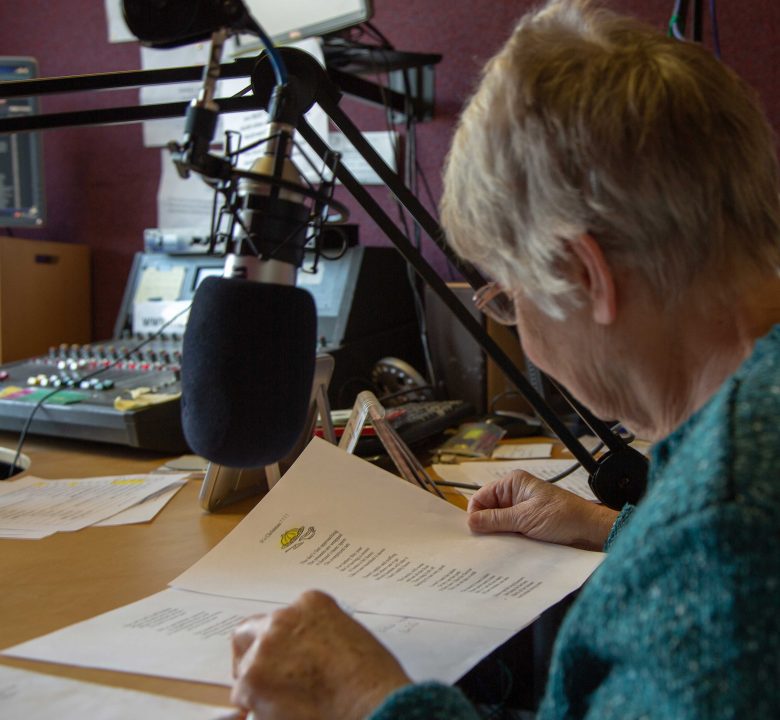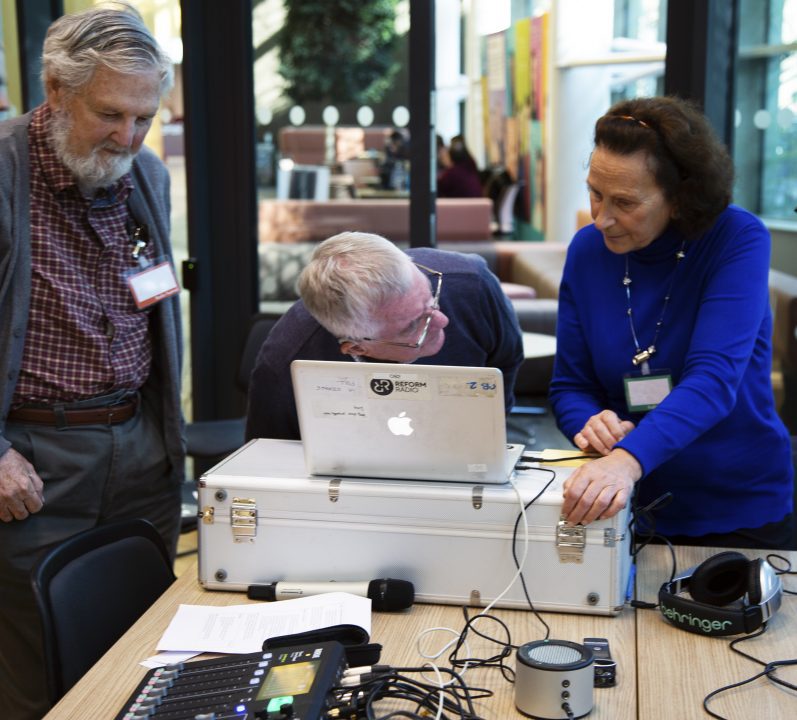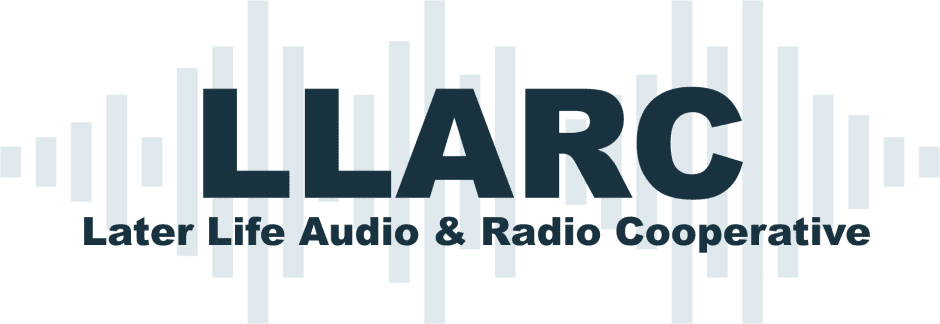An award-winning co-operative empowering older adults in the field of radio and broadcasting is going from strength to strength.
LLARC – Later Life Audio and Radio Co-operative – aims to promote positive views of age and ageing, working with a range of organisations including age-inclusive radio stations, third-sector organisations, local authorities and academic researchers.
Developed from an initial research project and broadcast in 2019, it has rapidly evolved into a UK-wide network challenging ageism on the airwaves.
Co-founder Dr Mervyn Eastman has worked all his life in social care, much of it specialising in issues related to age and ageing. Now retired, he devotes 18 hours a week working for LLARC from his home in Essex and countering misconceptions about growing older.

“All too often we see age through the prism of dependency, deficit and sickness,” he says. “As with many of the’ isms’ much of this becomes normalised so as we get older we are viewed in a certain way. It’s about not absorbing those narratives. Most older adults, even into their 80s, are relatively fit with good cognitive functioning.”
LLARC’s story starts in October 2019, when founding members met in York and decided to set up a network. In February 2020 – just as Covid-19 lockdowns began – they created a Mixcloud page showcasing their content. March 2020 saw the fledgling project join Co-operatives UK and become a co-operative. 2021 brought £10,000 in funding from the Engineering and Physical Sciences Research Council and an award from Newcastle University plus the first podcast from Sonder Radio, a Manchester-based production company championing older voices.
Related: Media Co-op celebrates 20 years of award-winning productions
The co-operative’s first AGM was in July 2021 with Rose Marley CEO of Co-operatives UK attending, and since then it has gone from strength to strength, broadcasting on various community radio stations as well as enjoying its own dedicated platform via Mixcloud.
Alongside Sonder Radio, professional partners include Older Voices, a community radio show produced by the Elders Council of Newcastle.

LLARC co-op membership currently stands at about 50 and although most are older people it aims to be cross-generational.
“We have quite a few older adults with a background in broadcasting as well as academics participating and engaging in top-quality products and content,” says Eastman. “We are still quite small but our reach is much broader through internet broadcasts and social media.”
Governance of the co-op is resolutely egalitarian with everyone having an equal say, but at its outset, there was a debate regarding the structure: should LLARC be set up as a charity, social enterprise or co-operative? The co-op model was chosen: “We decided we didn’t want a hierarchy. It’s open membership and everyone is equal. We also want to try to encourage people to think about co-ops in a much broader way, and use their values and principles.”
LLARC is run by a number of supporting ‘circles’ focusing on everything from strategy and finance to production and training. Two representatives from each sit on the general circle which makes the major strategic decisions. Funding is a major priority.
The organisation has no paid staff, and has relied on donations and funding to carry on. “However, it’s all based on goodwill,” says Dr Eastman. “The Funding and Finance Circle is currently looking at strategic bids and we are putting together a business plan. We are also looking to increase our membership, and our footprint and profile within the co-op movement and community radio and general audio landscape.”
Co-founder Dr Arlind Reuter, now researching gerontology at Lund University in Sweden, pioneered LLARC via her post-graduate research and is still a key member.

“My involvement started through my research in Newcastle on content creation as a form of civic participation in later life,” she says. I connected with older radio and podcast show hosts across the UK and we were able to bring everybody together at a Radio Festival in 2019, which ultimately resulted in LLARC as an initiative to empower older radio content creators.”
Dr Reuter is part of LLARC’s Production Circle, which makes the creative decisions around broadcasts. “All content is driven by older people and, as long as it fits with LLARC values, we aim to represent the diverse interests of older people and produce a range of shows.
“The programming is either decided by each of the individual LLARC affiliated stations or created within LLARC. We use our Mixcloud to share content that members produce, for example, Radio Tyneside or Older Voices productions, which are stations and shows affiliated with LLARC, or content produced specifically for us.
“In my view, it is a unique example of a co-operative that draws on intergenerational intelligence and aims to advocate for a more inclusive and diverse media landscape that values the voices of older adults.”
In the years to come, Dr Eastman believes the co-operative can make a significant difference to the way in which older people are perceived or, as he puts it, ‘infantilised’.
“Even when it’s well-meant you get what I call ‘compassionate ageism’ so people are often seen in terms of gifting and benevolence, i.e. doing things ‘to’ or ‘for’ them instead of being seen as an active part of the community. For example, there is a real issue around how we perceive older people in the context of sex and intimacy so a colleague and I co-edited a provocation paper called ‘Sex, Intimacy and Sexual Well-being in Later Life,’ challenging stereotypes around sex and older people.
“Then there is the issue of loneliness which is often seen through the framework of old age, when surveys show older people are often less lonely than isolated young mums or students. It’s about breaking that sort of mindset and the assumptions and presumptions; through this we are able to challenge to help end unconscious ageism and the ghettoisation of older people.”
He is clear that LLARC is not about passive listening, but about people being actively involved in front and behind the mic, developing skills in pre and post production planning, content and editing.
“We want to improve participation and offer the direct, unfiltered voices of older adults, creating audio/radio content by diverse groups of older adults and encourage those of us in our later years to contribute to social cohesion and inclusion between the generations.”
LLARC also aims to share best practice within audio and radio communities confronting programming that is consciously or unconsciously perpetrating ageist attitudes and assumptions.
“I am 73 now but I still celebrate who I am,” says Dr Eastman, “and even if I begin to have challenges, I would say don’t treat me as a victim of age but as the person I am, was and always will be.”

